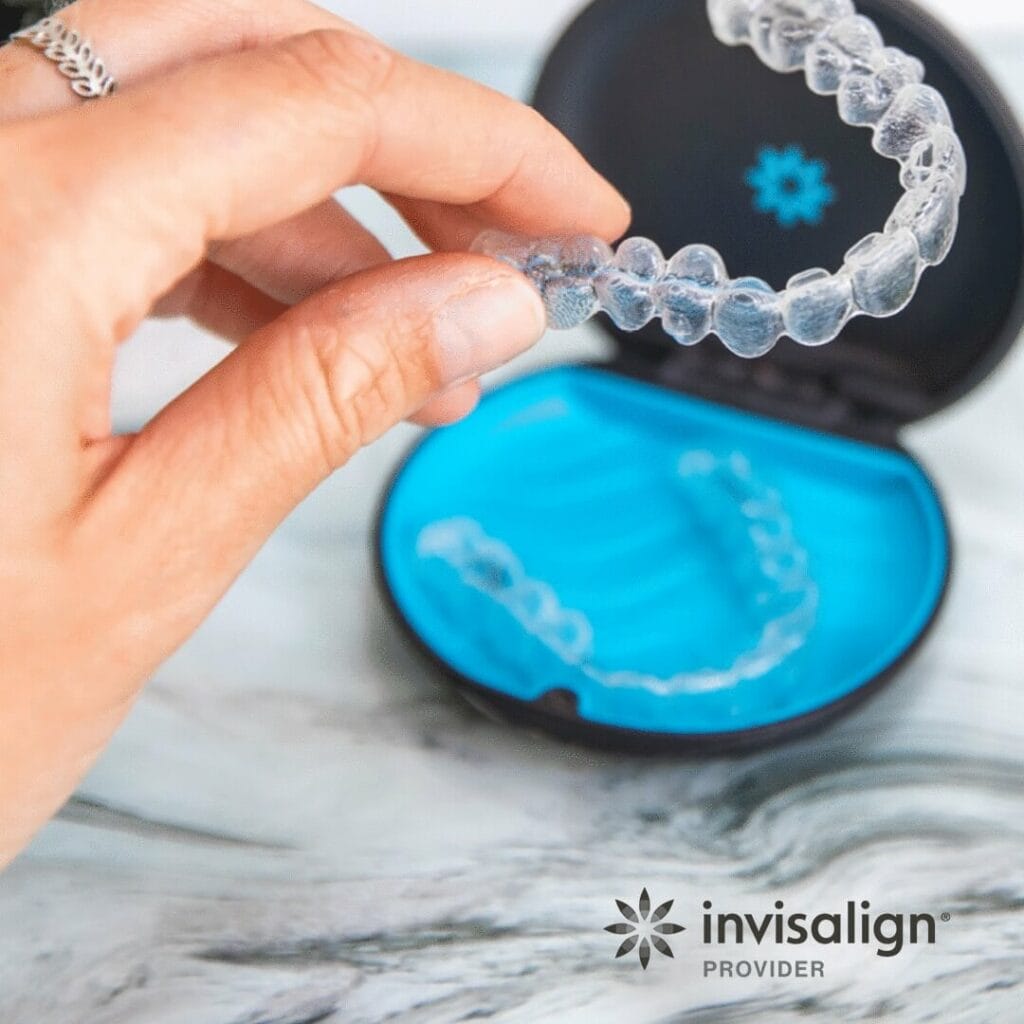Contrary to the common perception of Invisalign being solely for aesthetic improvements, its utility goes much deeper. Beyond providing patients with a more aligned smile, Invisalign significantly addresses various bite and jaw problems that could lead to complex oral health concerns.
Teeth grinding, or bruxism, can be a troublesome condition for some people. Fortunately, Invisalign can offer a potential solution by correcting the alignment of teeth and bite. In this blog post, we will discuss how Invisalign can help alleviate teeth grinding, assess if you are a suitable candidate for Invisalign with bruxism, and explain the treatment process for those with misaligned bite. Additionally, we will highlight the advantages of Invisalign for those seeking to manage their bruxism and achieve a healthier, more attractive smile.

Even though using Invisalign won’t stop you from grinding your teeth at night, using the aligners can benefit people with bruxism. These aligners act as a protective layer between the teeth during sleep, minimizing excessive wear and guarding against the damage caused by persistent grinding. They provide a cushion between the teeth, which helps to address the unwanted side effects of bruxism.
For those experiencing jaw pain and symptoms of teeth grinding due to misaligned teeth or an abnormal bite, Invisalign gradually corrects these issues, promoting proper alignment and reducing pressure on the jaw joints. This orthodontic treatment option reduces abnormal bite forces and improves dental and oral health.
In addition, dentists often suggest Invisalign as an alternative to traditional metal braces for bruxism patients because it offers dual benefits of alignment and protection. Unlike conventional braces with metal brackets, Invisalign’s flexible plastic material avoids additional irritation and discomfort, offering a more comfortable treatment experience.
If you have bruxism and are considering Invisalign, it’s important to consult with a dentist to determine if you’re a suitable candidate. Factors such as the severity of your condition, any existing dental issues, and the alignment of your bite are all important considerations. In cases of severe or chronic bruxism, an integrative treatment plan may be necessary, which could involve using night guards in addition to aligner therapy.
During your consultation, your dentist or orthodontist will assess the condition of your jaw, bite, and temporomandibular joint disorders to determine the most suitable treatment plan for you. Additionally, they will examine the overall health of your teeth, including any previous damage such as cracked or loose teeth.
Patients undergoing treatment for bruxism with Invisalign need to consider some additional factors. They may need to use aligner chewies, which are small rubbery tools that help the aligners fit snugly and counteract the displacement caused by grinding. The constant pressure and grinding can also require more frequent replacement of the aligners. Your orthodontic team will monitor and adjust your treatment plan as needed.
In addition, a custom night guard may be recommended to complement the Invisalign aligners. This provides an extra layer of protection against the effects of bruxism and ensures that the teeth are shielded from excessive wear. This can help mitigate the symptoms of grinding.
Teeth grinding can have several underlying causes, including:
Emotional factors: Stress, anxiety, anger, or frustration can often lead to awake bruxism, linking teeth grinding with emotional states.
Genetic influence: Sleep bruxism tends to have a hereditary link, suggesting it can run in families.
Sleep-related disorders: Conditions like sleep apnea can contribute to teeth grinding.
Medication: Certain medications might lead to bruxism as a side effect.
Substance consumption: Caffeine, alcohol, and tobacco products can stimulate teeth grinding.
Health conditions: Various health conditions, including Gastroesophageal Reflux Disorder (GERD), Parkinson’s disease, dementia, and Attention Deficit Hyperactivity Disorder (ADHD) could be contributors.
Dental issues: Misaligned teeth and bite problems can create conditions conducive to bruxism.
The cost of Invisalign treatment is generally not directly influenced by whether you grind your teeth. You can indeed undergo Invisalign treatment even if you have a habit of grinding your teeth. However, it is important to note that individuals who grind their teeth may have specific needs that could lead to additional indirect costs, such as the need for more aligners or treatments due to wear and tear. Thus, while the primary cost may remain unchanged, it is important to be aware of the potential additional costs that may arise from teeth grinding.
Bruxism is a condition that causes teeth to become worn-down, chipped, or fractured, which can lead to increased tooth sensitivity, jaw pain, and discomfort in the facial muscles. This condition can occur when a person is both awake and asleep, with a significant percentage of adults experiencing it primarily at night. If left untreated, severe bruxism can damage dental work and contribute to disorders like temporomandibular joint (TMJ) issues that can significantly impact oral health.
While occasional teeth grinding usually doesn’t cause damage to the aligners itself, chronic teeth grinding can lead to teeth that are worn down, chipped, or cracked.
The primary benefit of choosing Invisalign is its aesthetic appeal, flexibility, and suitability for adult patients who wish to maintain good oral hygiene and lifestyle choices.

Invisalign aligners are effective in correcting misaligned teeth and bite issues and protecting against the habitual grinding of teeth. They provide numerous benefits, such as improving oral health, reducing jaw pain, and preventing significant damage to the tooth enamel. Invisalign is an excellent option for individuals who want to manage their bruxism effectively.
By promoting proper tooth alignment and offering protection against grinding forces, Invisalign contributes to a healthier and more beautiful smile. It is both a therapeutic and a cosmetic treatment, replacing traditional braces and providing a more aesthetic and comfortable experience.
If you live in the Fairview Allen area and want to straighter teeth, you can schedule a complimentary consultation with an Invisalign dentist to determine if you are a good candidate. We can answer your questions and help you begin your journey towards a healthier, more functional smile. To schedule a your intial consultation appointment, call us today at 972-468-1440.
Our dental office is located in Fairview, Texas, and our patients visit us from across the surrounding areas, including Allen, Plano, McKinney, and Lucas.
We firmly believe that the internet should be available and accessible to anyone, and are committed to providing a website that is accessible to the widest possible audience, regardless of circumstance and ability.
To fulfill this, we aim to adhere as strictly as possible to the World Wide Web Consortium’s (W3C) Web Content Accessibility Guidelines 2.1 (WCAG 2.1) at the AA level. These guidelines explain how to make web content accessible to people with a wide array of disabilities. Complying with those guidelines helps us ensure that the website is accessible to all people: blind people, people with motor impairments, visual impairment, cognitive disabilities, and more.
This website utilizes various technologies that are meant to make it as accessible as possible at all times. We utilize an accessibility interface that allows persons with specific disabilities to adjust the website’s UI (user interface) and design it to their personal needs.
Additionally, the website utilizes an AI-based application that runs in the background and optimizes its accessibility level constantly. This application remediates the website’s HTML, adapts Its functionality and behavior for screen-readers used by the blind users, and for keyboard functions used by individuals with motor impairments.
If you’ve found a malfunction or have ideas for improvement, we’ll be happy to hear from you. You can reach out to the website’s operators by using the following email
Our website implements the ARIA attributes (Accessible Rich Internet Applications) technique, alongside various different behavioral changes, to ensure blind users visiting with screen-readers are able to read, comprehend, and enjoy the website’s functions. As soon as a user with a screen-reader enters your site, they immediately receive a prompt to enter the Screen-Reader Profile so they can browse and operate your site effectively. Here’s how our website covers some of the most important screen-reader requirements, alongside console screenshots of code examples:
Screen-reader optimization: we run a background process that learns the website’s components from top to bottom, to ensure ongoing compliance even when updating the website. In this process, we provide screen-readers with meaningful data using the ARIA set of attributes. For example, we provide accurate form labels; descriptions for actionable icons (social media icons, search icons, cart icons, etc.); validation guidance for form inputs; element roles such as buttons, menus, modal dialogues (popups), and others. Additionally, the background process scans all of the website’s images and provides an accurate and meaningful image-object-recognition-based description as an ALT (alternate text) tag for images that are not described. It will also extract texts that are embedded within the image, using an OCR (optical character recognition) technology. To turn on screen-reader adjustments at any time, users need only to press the Alt+1 keyboard combination. Screen-reader users also get automatic announcements to turn the Screen-reader mode on as soon as they enter the website.
These adjustments are compatible with all popular screen readers, including JAWS and NVDA.
Keyboard navigation optimization: The background process also adjusts the website’s HTML, and adds various behaviors using JavaScript code to make the website operable by the keyboard. This includes the ability to navigate the website using the Tab and Shift+Tab keys, operate dropdowns with the arrow keys, close them with Esc, trigger buttons and links using the Enter key, navigate between radio and checkbox elements using the arrow keys, and fill them in with the Spacebar or Enter key.Additionally, keyboard users will find quick-navigation and content-skip menus, available at any time by clicking Alt+1, or as the first elements of the site while navigating with the keyboard. The background process also handles triggered popups by moving the keyboard focus towards them as soon as they appear, and not allow the focus drift outside of it.
Users can also use shortcuts such as “M” (menus), “H” (headings), “F” (forms), “B” (buttons), and “G” (graphics) to jump to specific elements.
We aim to support the widest array of browsers and assistive technologies as possible, so our users can choose the best fitting tools for them, with as few limitations as possible. Therefore, we have worked very hard to be able to support all major systems that comprise over 95% of the user market share including Google Chrome, Mozilla Firefox, Apple Safari, Opera and Microsoft Edge, JAWS and NVDA (screen readers), both for Windows and for MAC users.
Despite our very best efforts to allow anybody to adjust the website to their needs, there may still be pages or sections that are not fully accessible, are in the process of becoming accessible, or are lacking an adequate technological solution to make them accessible. Still, we are continually improving our accessibility, adding, updating and improving its options and features, and developing and adopting new technologies. All this is meant to reach the optimal level of accessibility, following technological advancements. For any assistance, please reach out to